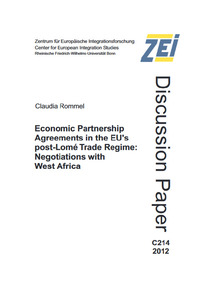Economic partnership agreements in the EU's post-Lomé trade regime: negotiations with West Africa

Economic partnership agreements in the EU's post-Lomé trade regime: negotiations with West Africa

| dc.contributor.author | Rommel, Claudia | |
| dc.date.accessioned | 2022-06-24T14:31:26Z | |
| dc.date.available | 2022-06-24T14:31:26Z | |
| dc.date.issued | 2012 | |
| dc.identifier.uri | https://hdl.handle.net/20.500.11811/9949 | |
| dc.description.abstract | Trade is a key element of the development policy of the European Union (EU). As the most important trading partner of developing countries, the EU attempts to facilitate the participation of developing countries in global trade and contribute to economic growth through providing market access and financial assistance. For twenty-five years, the commitment of the EU was largely focused on its former colonies, more specifically in Africa, the Caribbean and the Pacific (ACP). The developing world, in terms of the EU’s trade policy, was therefore divided between ACP states with special provisions under the Lomé Conventions and all other developing countries. With the new millennium, this special relationship came to an end. Pressure from several member states1 and the World Trade Organization (WTO) led to an overhaul of the EU’s trade regime vis-à-vis developing countries and to the loss of the privileged position of ACP countries.
The result of this overhaul is still pending. Economic Partnership Agreements (EPAs) – to be negotiated between the EU and several ACP regions – have only been realized in the Caribbean. This article will to examine the negotiations between the EU and West Africa and discuss the interests involved on the African side. Following the introduction, the second part of this article is dedicated to the Lomé Conventions with a focus on the change occurring from the third to the fourth revision in order to understand the current situation. The third part is going to take a look at the Cotonou agreement and the trade regime of the EU in general before turning to the negotiations for an Economic Partnership Agreement between the EU and West Africa. The conclusion summarizes the main findings. | en |
| dc.format.extent | 27 | |
| dc.language.iso | eng | |
| dc.relation.ispartofseries | ZEI Discussion Paper ; C214 | |
| dc.rights | In Copyright | |
| dc.rights.uri | http://rightsstatements.org/vocab/InC/1.0/ | |
| dc.subject | Europäische Union | |
| dc.subject | Handelspolitik | |
| dc.subject | Lomé-Abkommen | |
| dc.subject | Westafrika | |
| dc.subject | Organisation Afrikanischer, Karibischer und Pazifischer Staaten | |
| dc.subject | Cotonou-Abkommen | |
| dc.subject.ddc | 320 Politik | |
| dc.subject.ddc | 330 Wirtschaft | |
| dc.title | Economic partnership agreements in the EU's post-Lomé trade regime: negotiations with West Africa | |
| dc.type | Arbeitspapier | |
| dc.publisher.name | Zentrum für Europäische Integrationsforschung (ZEI) | |
| dc.publisher.location | Bonn | |
| dc.rights.accessRights | openAccess | |
| dc.relation.pissn | 1435-3288 | |
| dc.relation.pisbn | 978-3-941928-14-5 | |
| dc.relation.url | https://www.zei.uni-bonn.de/de/publikationen/medien/zei-dp/zei-dp-214-2012.pdf | |
| ulbbn.pubtype | Zweitveröffentlichung | |
| dc.version | publishedVersion |
Dateien zu dieser Ressource
Das Dokument erscheint in:
-
ZEI Discussion Paper (286)




